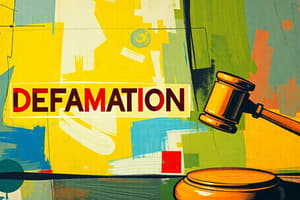Podcast
Questions and Answers
What must be proven to use the section one defence under the Defamation Act 1996?
What must be proven to use the section one defence under the Defamation Act 1996?
- You took reasonable care. (correct)
- You authored the statement.
- You were the editor of the statement.
- You published the statement.
A broadcaster can use the section one defence if a defamatory statement is made during a recorded interview.
A broadcaster can use the section one defence if a defamatory statement is made during a recorded interview.
False (B)
What action must website operators take regarding defamatory content once they are made aware of it?
What action must website operators take regarding defamatory content once they are made aware of it?
Remove the defamatory content immediately.
To successfully claim a defence under the Defamation Act, you must show you had no ______ to believe the statement was defamatory.
To successfully claim a defence under the Defamation Act, you must show you had no ______ to believe the statement was defamatory.
Match the following roles with their responsibilities under the Defamation Act:
Match the following roles with their responsibilities under the Defamation Act:
Which of the following is NOT a requirement for qualified privilege in Part 2?
Which of the following is NOT a requirement for qualified privilege in Part 2?
An editor is legally required to obtain a comment from someone who has been defamed in instances of qualified privilege.
An editor is legally required to obtain a comment from someone who has been defamed in instances of qualified privilege.
What must a newspaper do to utilize the Offer of Amends defense under the Defamation Act 1996?
What must a newspaper do to utilize the Offer of Amends defense under the Defamation Act 1996?
Qualified privilege is applicable in cases of a matter of __________.
Qualified privilege is applicable in cases of a matter of __________.
What must website operators do to receive protection under Section 5 of the Defamation Act 2013?
What must website operators do to receive protection under Section 5 of the Defamation Act 2013?
Match the following elements of defamation law with their descriptions:
Match the following elements of defamation law with their descriptions:
Website operators are required to pre-moderate comments to ensure they do not receive protection under the Defamation Act.
Website operators are required to pre-moderate comments to ensure they do not receive protection under the Defamation Act.
Name one defense against defamation that involves the time factor.
Name one defense against defamation that involves the time factor.
A website operator can be protected under Regulation 19 against defamation actions when their readers post comments directly onto their ______.
A website operator can be protected under Regulation 19 against defamation actions when their readers post comments directly onto their ______.
Match the following defenses with their descriptions:
Match the following defenses with their descriptions:
What cannot be used as a defence in defamation cases?
What cannot be used as a defence in defamation cases?
An honest opinion can suggest corruption or dishonour.
An honest opinion can suggest corruption or dishonour.
What are the two forms of privilege under the defamation act?
What are the two forms of privilege under the defamation act?
The media has the protection of __________ under the defamation act for reporting court cases.
The media has the protection of __________ under the defamation act for reporting court cases.
Match the following criteria for reporting under Absolute Privilege:
Match the following criteria for reporting under Absolute Privilege:
Which of the following is a requirement for an honest opinion to be valid?
Which of the following is a requirement for an honest opinion to be valid?
An honest person can hold any opinion, regardless of the facts.
An honest person can hold any opinion, regardless of the facts.
What is the primary criterion that distinguishes an opinion from a fact in defamation cases?
What is the primary criterion that distinguishes an opinion from a fact in defamation cases?
What must be done when reporting allegations in a court case?
What must be done when reporting allegations in a court case?
Absolute privilege applies to court proceedings held in private.
Absolute privilege applies to court proceedings held in private.
What should a reporter do if they make an inaccurate paraphrasing of court statements?
What should a reporter do if they make an inaccurate paraphrasing of court statements?
To maintain absolute privilege, reports must be published __________.
To maintain absolute privilege, reports must be published __________.
Match the following privileges to their definitions:
Match the following privileges to their definitions:
Which of the following is NOT covered under qualified privilege?
Which of the following is NOT covered under qualified privilege?
A small typo in a court report is unlikely to cause legal problems.
A small typo in a court report is unlikely to cause legal problems.
What must be indicated when reporting on a defendant in a trial?
What must be indicated when reporting on a defendant in a trial?
Which of the following statements is true about absolute privilege in Parliament?
Which of the following statements is true about absolute privilege in Parliament?
Journalists receive absolute privilege when reporting on parliamentary proceedings.
Journalists receive absolute privilege when reporting on parliamentary proceedings.
What is required for media reports of press conferences to be considered under qualified privilege?
What is required for media reports of press conferences to be considered under qualified privilege?
Local councils, central government departments, and the police are examples of authorities that provide qualified privilege for _____ statements.
Local councils, central government departments, and the police are examples of authorities that provide qualified privilege for _____ statements.
Match the type of meeting or body with its corresponding privilege type:
Match the type of meeting or body with its corresponding privilege type:
Which case is specifically mentioned regarding qualified privilege at press conferences?
Which case is specifically mentioned regarding qualified privilege at press conferences?
Public meetings for the discussion of matters of public interest qualify for absolute privilege.
Public meetings for the discussion of matters of public interest qualify for absolute privilege.
What significant change occurred in the year 2000 regarding press conferences and privilege?
What significant change occurred in the year 2000 regarding press conferences and privilege?
Flashcards
Qualified Privilege Part 2
Qualified Privilege Part 2
A legal defense against defamation where the publication is fair, accurate, on a matter of public interest, and includes a reasonable right of reply.
Right of Reply
Right of Reply
The opportunity for someone who has been defamed to respond to the allegation in the publication.
Offer of Amends
Offer of Amends
A legal defense under the Defamation Act 1996 where a publication admits an unintentional libel and offers a correction or apology.
Accord and Satisfaction
Accord and Satisfaction
Signup and view all the flashcards
Section 1, Defamation Act
Section 1, Defamation Act
Signup and view all the flashcards
No Reason to Believe Defence
No Reason to Believe Defence
Signup and view all the flashcards
Website Operator Defence (Defamation Act 2013)
Website Operator Defence (Defamation Act 2013)
Signup and view all the flashcards
Section One Defence
Section One Defence
Signup and view all the flashcards
Author/Editor/Publisher
Author/Editor/Publisher
Signup and view all the flashcards
Regulation 19 Defence
Regulation 19 Defence
Signup and view all the flashcards
Death of Complainant Defence
Death of Complainant Defence
Signup and view all the flashcards
Reasonable Care
Reasonable Care
Signup and view all the flashcards
Consent Defence
Consent Defence
Signup and view all the flashcards
Live Broadcast Defamation
Live Broadcast Defamation
Signup and view all the flashcards
Website Operator Defamation
Website Operator Defamation
Signup and view all the flashcards
Honest Opinion Defence
Honest Opinion Defence
Signup and view all the flashcards
Requirements for Honest Opinions
Requirements for Honest Opinions
Signup and view all the flashcards
Limitations of Honest Opinion
Limitations of Honest Opinion
Signup and view all the flashcards
Recognizable Comment
Recognizable Comment
Signup and view all the flashcards
Absolute Privilege
Absolute Privilege
Signup and view all the flashcards
Privilege in the Courts
Privilege in the Courts
Signup and view all the flashcards
Fair Reporting
Fair Reporting
Signup and view all the flashcards
Contemporaneous Reporting
Contemporaneous Reporting
Signup and view all the flashcards
Absolute Privilege in Parliament
Absolute Privilege in Parliament
Signup and view all the flashcards
Qualified Privilege for Journalists
Qualified Privilege for Journalists
Signup and view all the flashcards
Qualified Privilege: Government Public Information
Qualified Privilege: Government Public Information
Signup and view all the flashcards
Qualified Privilege: Press Conferences
Qualified Privilege: Press Conferences
Signup and view all the flashcards
Qualified Privilege: Public Meetings
Qualified Privilege: Public Meetings
Signup and view all the flashcards
Qualified Privilege: Adjudicating Bodies
Qualified Privilege: Adjudicating Bodies
Signup and view all the flashcards
Qualified Privilege: Annual General Meetings (AGMs)
Qualified Privilege: Annual General Meetings (AGMs)
Signup and view all the flashcards
Requirements for Qualified Privilege
Requirements for Qualified Privilege
Signup and view all the flashcards
Reporting Allegations
Reporting Allegations
Signup and view all the flashcards
Attributing Statements
Attributing Statements
Signup and view all the flashcards
Defendant's Plea
Defendant's Plea
Signup and view all the flashcards
Reporting Both Sides
Reporting Both Sides
Signup and view all the flashcards
Absolute Privilege in Court
Absolute Privilege in Court
Signup and view all the flashcards
Qualified Privilege
Qualified Privilege
Signup and view all the flashcards
Defamation Act 1996
Defamation Act 1996
Signup and view all the flashcards
Study Notes
Defamation Defences
- Honest Opinion: Protects expressions of honest opinion, cannot be used to defend factual allegations. Widely used by media.
- Requirements of Honest Opinion: Published comment must be honestly held opinion, recognizable as opinion, based on provable fact or privileged material, and refer to the fact/information on which it is based.
- Honest Opinion Limitations: Cannot suggest corruption/dishonor, be motivated by malice. Must be an opinion an honest person could hold given facts at the time. Cannot pluck allegations from thin air. A 'passing reference' to previous events can be enough factual basis.
- No Corruption/Dishonour: Examples like lying, cheating, criminal activity prevent honest opinion defence if expressed as fact, even if presented as opinion.
- Privilege under Defamation Act: Two forms:
- Absolute privilege: Protects reporting of court cases that are fair, accurate, contemporaneous, and of publicly held proceedings.
- Qualified privilege: Applies to non-contemporaneous court reports, Parliamentary proceedings, public inquiries, official statements, press conferences, media reports of international organizations, notices/documents from judges, and annual general meetings of listed companies.
Absolute Privilege in Courts
- Fairness/Accuracy: Absolute privilege is not about reporting truth, but about reporting fairly and accurately what was said in open court, even if the allegations are false.
- Requirements for fairness: Must give context (e.g. defendant's plea), must report both sides of an argument.
- Publicity: Reporting must be of public proceedings and published contemporaneously.
Qualified Privilege in Part 1
- Expanded coverage: Applies to expanded categories of media reports of non-contemporaneous court reports, proceedings of Parliament, public inquiries, conferences of international organizations, notices/documents from judges, and annual general meetings of listed companies.
- Parliamentary/Official Statements: Qualified privilege protects reporting of statements made within Parliament.
- Other Circumstances: Covers reports of courtrooms, tribunals, and other official proceedings.
Qualified Privilege in Part 2
- Media Reports: Protects reports of copies or extracts of statements, press releases, quotes, interviews, documents, etc., issued for public information and on behalf of government. This includes local councils, central government, police, navy, army.
- Public Meetings: Protects reporting of discussions at any public meeting relating to a matter of public interest, e.g. local authority meetings.
- Adjudicating Bodies: Privilege for reports of findings and decisions made by bodies with the power to adjudicate (e.g., The FA, sporting bodies, academic institutions).
Qualified Privilege - Further Aspects
- Required elements: Media needs to take fair, accurate, and unbiased reporting efforts in publication.
- Publications to be reviewed: Articles and records published on websites, in print, or by other media.
Section 1, Defamation Act
- When someone else comments: Protects against being sued if another commentator publishes a defamatory remark on your website or in a live broadcast.
- Proof required: Need to show that the person making the comment on your platform didn't make the statement and were not the author/editor/publisher of the statement.
Broadcasters and Website Operators
- General Defences: Need to show care during broadcast or publishing process.
- Removal of Defamatory Content:
- Moderation: Moderator actions on comments may constitute authorization or publishing of the content.
Regulation 19 - Website Operators
- General Protection: Provides general protection to website moderators from defamation claims.
- Comment Removal: Encourages immediate removal of any defamatory or illegal posts.
- Breaches of Law: Protects the platform from instances of criminal activity in comments or posts.
Other Defences
- Death of Complainant: If the complainant dies before the process can run through the court.
- Settlement/Leave and Licence: If there was agreement to public statement.
- Time Limits: Proceedings need to be initiated within one year of the publication.
Studying That Suits You
Use AI to generate personalized quizzes and flashcards to suit your learning preferences.




